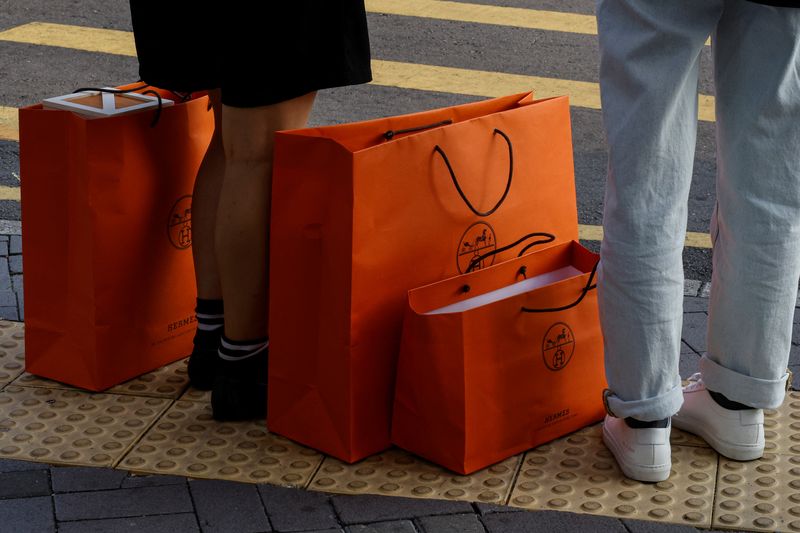(This Oct. 9 story has been corrected to repair the analyst’s estimate of the scale of the China market to 25%, not 35%, of the worldwide whole, in paragraph 9)
By Casey Corridor
SHANGHAI (Reuters) – European luxurious shares have slid on investor considerations that Hermes purses and Dior slingbacks could also be Beijing’s subsequent targets for retaliation, following the EU’s choice to slap tariffs on China EVs, however analysts say such a transfer is unlikely.
“It’s a question of how Beijing will respond to the EV tariffs. Is there going to be an escalation? I think yes. Is it going to go after luxury goods? I don’t think so,” mentioned Patrice Nordey, CEO of Shanghai-based innovation consultancy Trajectry.
Thus far, strikes by China within the ongoing tit-for-tat commerce spat with the EU have focused brandy, pork and dairy, all of that are main industries for France, which lobbied for tariffs on Chinese language-made EVs imported into the EU.
Shares of LVMH, which additionally markets high-end Hennessy cognac, Hermes, Kering (EPA:), Ferragamo, and Burberry dropped 2%-6% on Tuesday after Beijing mentioned it could impose non permanent anti-dumping measures on imports of brandy.
Jacques Roizen, managing director of China consulting at Digital Luxurious Group, mentioned concentrating on luxurious items in China would run counter to what has been persistently beneficial insurance policies for luxurious companies on this planet’s second-largest financial system, the place Beijing is keen to maintain extra luxurious spending, moderately than see its customers splurge in abroad markets.
He factors to the instance of Hainan, which has been constructed into a significant duty-free hub largely as a result of acknowledgement from policymakers that luxurious spending in China is nice for the nation.
“When luxury goods sales are taking place in China, that means more tax revenue, and it’s significant,” he mentioned.
“If there were a new fiscal environment that forced luxury brands to increase their price in China, it would create further incentive for Chinese consumers to make their luxury expenditures outside China, which is the opposite of what the government wants.”
The dimensions of the Chinese language luxurious market, even contemplating its latest slowdown, is predicted to account for 25% of the worldwide whole this yr, based on Jelena Sokolova, senior fairness analyst at Morningstar.
This helps to clarify the response of European luxurious shares to each announcement that comes from China, she mentioned, but in addition implies that even the specter of introducing tariffs or elevating home consumption taxes on imported luxurious items would hit French luxurious conglomerates the place it hurts.
French brandy shipments to China reached $1.7 billion final yr and accounted for 99% of the nation’s imports of the spirit, whereas 11 billion euros ($12 billion) in European luxurious items had been imported into China final yr.
However the very dimension of the posh items business would possibly make it a much less doubtless goal for Beijing, based on Albert Hu, professor of economics on the China Europe Worldwide Business Faculty in Shanghai.
“I think at this point, neither EU nor China wants a full- scale trade war that would hurt both economies,” he mentioned, including that China’s comparatively cautious orchestration of retaliatory targets so far signifies Beijing is keen to proceed negotiating and dealing in the direction of a compromise with Brussels.
The character of the posh items business additionally makes it tough for China to moderately arise claims about dumping.

“It’s hard, logically, to justify that there is a case for dumping $2,000 handbags,” Sokolova mentioned.
($1 = 0.9122 euros)




